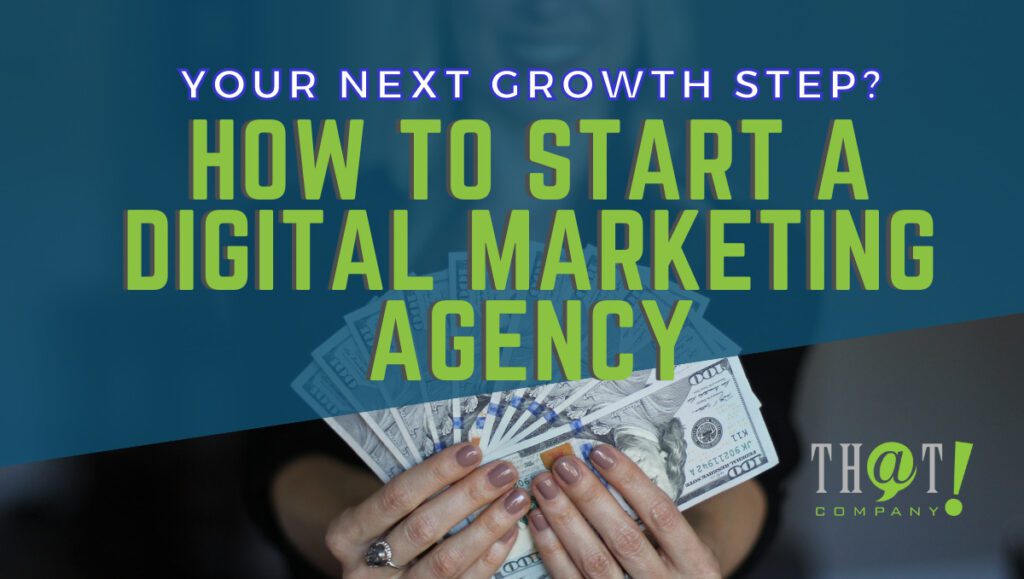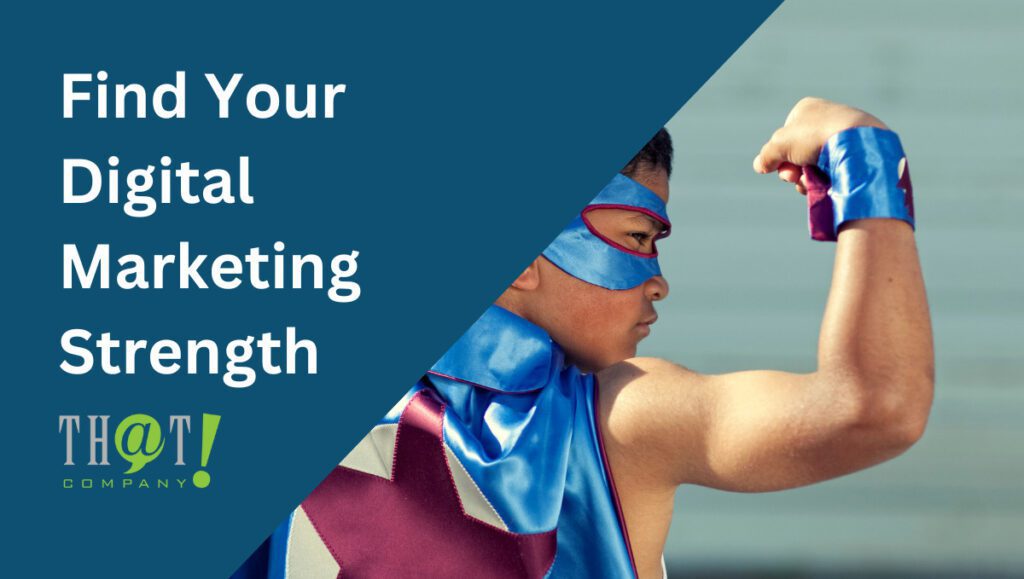
There has never been a better time to learn how to start a digital marketing agency. With the industry booming and ever-evolving, the opportunities to make a significant impact are endless. But how do you navigate this fast-paced world and ensure success? In this guide, we’ll take you through a step-by-step process on how to start a digital marketing agency and thrive in this competitive landscape. So let’s dive into “how to start a digital marketing agency” and make your mark in the industry.
Executive Summary
- Stay up-to-date with current digital marketing trends to maximize success and seize growth opportunities.
- Leverage the potential in services such as SEO, social media, PPC ads & more for profitable opportunities.
- Identify strengths & passions to differentiate yourself in the industry and provide valuable solutions for clients.
- Accelerate starting your digital marketing business through White Label Services by That! Company.
Understanding the Digital Marketing Landscape

The digital marketing industry is flourishing, with global spending projected to reach a staggering $571.16 billion in 2023. This rapid growth offers a myriad of exciting opportunities such as targeting new audiences, building rewarding customer relationships, and staying ahead of the competition. The most popular types of digital marketing agencies include SEO, content marketing, social media marketing, and PPC agencies, each providing unique opportunities to promote your business.
To succeed in this dynamic industry, it’s essential to stay updated on current trends and growth opportunities. Proactively researching industry trends and seizing growth opportunities is crucial for a thriving digital marketing agency. By understanding the landscape and offering in-demand services, your agency will be well-positioned to attract potential clients and grow your business.
Current Industry Trends
The US digital advertising market reached $560 billion in 2022, underscoring the immense potential of this industry. To stay ahead of the curve, it’s vital to be aware of the latest trends and types of digital marketing agencies. For instance, full-service agencies offer everything from design and development to paid media, local marketing, social media marketing, and content marketing. Setting clear goals for your agency is crucial, as it gives a sense of direction and helps you stay committed to your vision.
Social media marketing agencies, in particular, are gaining popularity due to their ability to build a strong social presence, cultivate a loyal audience, and generate quality leads. These agencies provide incredible deliverables like content creation, scheduling, and influencer marketing. To succeed in this niche, a social media marketing agency must be flexible, resourceful, and in tune with their clients’ goals. Additionally, SEO remains invaluable in driving organic traffic and saving money on costly paid ads.
Growth and Opportunities
The digital marketing landscape offers an array of exciting opportunities, such as SEO, PPC, content marketing, and social media marketing. A digital marketing agency can help you reach your goals with services like SEO, lead generation, AdWords, and social media ads. With a plethora of niches to explore, including SEO, social media, pay-per-click ads, email marketing, video marketing, influencer marketing, and website design, there’s no shortage of growth potential.
Digital marketing agencies can generate profit margins of up to 40%, making them an attractive investment. Leveraging paid traffic can help you buy valuable data, and Facebook Advertising can be a highly profitable business. Tools like Semrush can help you improve your online visibility and gain valuable marketing insights to propel your success.
By recognizing market service gaps and capitalizing on them, you can make a quick and lasting impact in the digital marketing world.
Choosing Your Niche and Services

Before diving into the agency world, it’s crucial to choose a niche and services based on your strengths and passions. Research digital marketing agencies in your area of expertise. Consider their services, pricing and customer reviews to make an informed decision.
Consider whether you want to be a specialist agency or one that specializes in a particular industry but also offers other digital services. By offering a full range of digital marketing services, you ensure that your agency is well-equipped to help your clients reach their goals.
Common Digital Marketing Business Niches:
- Web Design and Development: Creating and optimizing websites for businesses.
- Social Media Marketing: Managing and promoting businesses on social media platforms.
- Search Engine Optimization (SEO services): Optimizing websites to improve their visibility on search engines.
- Content Marketing: Creating and distributing valuable and relevant content to attract and engage a target audience.
- Pay-Per-Click (PPC) Advertising: Managing paid advertising campaigns on search engines and social media platforms.
- Email Marketing: Designing and executing email campaigns to reach and engage customers.
- E-commerce Solutions: Helping businesses establish and optimize their online stores.
- Mobile App Development: Building mobile applications for various platforms.
- Branding and Identity: Developing brand strategies, logos, and visual assets for businesses.
- Analytics and Data Science: Collecting and analyzing data to make informed marketing decisions.
Uncommon Digital Marketing Business Niches:
- Augmented Reality (AR) Marketing: Creating AR experiences and campaigns to enhance marketing efforts.
- Voice Search Optimization: Optimizing content and websites for voice-activated search assistants like Siri and Alexa.
- Influencer Marketing: Collaborating with social media influencers to promote products or services.
- Virtual Reality (VR) Experiences: Developing immersive VR experiences for marketing and promotional purposes.
- Blockchain Marketing: Implementing blockchain technology in marketing campaigns or helping blockchain companies with their marketing efforts.
- Conversion Rate Optimization (CRO): Improving website performance and user experience to increase conversions.
- Growth Hacking: Using creative marketing strategies to rapidly grow and scale businesses.
- Chatbot Development: Building AI-powered chatbots for customer support and lead generation.
- Video Marketing and Production: Creating engaging videos for marketing purposes.
- UX/UI Design: Focusing on user experience and interface design to enhance the usability of websites and applications.
Also consider the industry/industries you might want to serve. Do you have specific industry experience or passion?
Common Vertical Industry Niches:
- Healthcare and Wellness: Providing digital marketing services tailored to healthcare providers, wellness centers, and medical technology companies.
- Real Estate: Offering digital marketing solutions for real estate agencies, property developers, and rental platforms.
- E-commerce and Retail: Specializing in digital marketing strategies for online stores, marketplaces, and retail brands.
- Hospitality and Tourism: Catering to hotels, travel agencies, and tourism destinations by providing digital marketing and booking solutions.
- Financial Services: Assisting banks, financial institutions, and fintech companies with digital marketing, lead generation, and customer acquisition.
- Education and E-learning: Offering digital marketing services for educational institutions, e-learning platforms, and online courses.
- Automotive: Providing digital marketing solutions for car dealerships, automotive manufacturers, and related businesses.
- Food and Beverage: Focusing on digital marketing strategies for restaurants, food delivery services, and beverage companies.
- Fashion and Apparel: Specializing in digital marketing and e-commerce solutions for fashion brands, clothing retailers, and fashion influencers.
- Professional Services: Serving law firms, consulting agencies, accounting firms, and other professional service providers with digital marketing and lead generation strategies.
Identifying Your Strengths and Passions

To succeed in the digital marketing industry, it’s essential to identify your strengths and passions. A successful digital marketing agency needs to have in-depth knowledge of digital platforms and marketing strategies, the ability to assess data and uncover key insights, organizational and project management capabilities, and the flexibility and resourcefulness to solve problems.
Additionally, excellent communication abilities and business savvy are vital. By leveraging your unique strengths and passions, you can provide value to clients and differentiate your agency in this competitive landscape.
Filling Market Gaps
To excel in the digital marketing space, it’s essential to identify market gaps and fill them with your services. Recognizing market service gaps can provide an opportunity to make a quick and lasting impact. Using keyword research tools like Semrush can help you uncover potential opportunities for online keyword-based advertising.
By seizing the opportunities identified from market gaps, you can offer unique services that cater to your target market’s needs. This approach allows you to differentiate your agency from competitors and ensures that you provide valuable services that help your clients succeed.
Building Your Online Presence

Getting an online presence set up is a crucial initial action to take in establishing your digital marketing agency. A professional website is essential for creating an online presence that showcases your expertise to prospective clients.
Moreover, a website can act as a hub for potential clients to learn more about your services, get in touch, and view your portfolio of work. Creating an online presence for your digital marketing agency can be incredibly advantageous, as it enables potential clients to discover and become familiar with your agency’s services.
Creating a Professional Website
A professional website is essential for any digital marketing agency. Platforms like WordPress come with awesome free templates for digital marketing agencies. WordPress is the perfect platform for constructing a website for a digital marketing agency. When creating a website, make sure it looks professional and clearly outlines your company, services offered, and the benefits that clients can gain from working with you.
Your website should be optimized for both desktop and mobile devices, and follow best practices for the services your agency plans to provide. Including industry-specific landing pages can help promote your expertise within specific industries and attract potential clients. By focusing on the problem your service solves or the application of your service, you can optimize your service-specific landing pages.
Managing Social Media Profiles
Social media profiles are also crucial for building an online presence. Having a professional online presence can give potential clients the confidence they need to hire you, so it’s essential to ensure your social media pages are up-to-date. Scheduling tools can help manage your social media profiles more efficiently.
By leveraging data on your audience personas and having a plan in place for engaging with your audience, you can maximize your social media strategy. Connecting your website to your social media accounts is a great way to promote your business and create captivating posts that showcase your products.
Developing a Business Plan and Pricing Strategy

A comprehensive business plan and pricing strategy are essential for any digital marketing agency. The business model of a digital marketing agency is leveraging specialized knowledge to help clients reach their goals for a fee.
A business plan can help a digital marketing agency achieve success by ensuring all areas of the business work together to reach their goals and provide a strong foundation for success. The estimated cost to start a digital marketing agency is between $10,000 to $30,000 for the first year, making it a great investment to get your business off the ground.
Crafting a Comprehensive Business Plan to Start a Digital Marketing Agency
When creating a business plan for a digital marketing agency, it’s essential to include the goals and objectives and a plan for achieving those objectives. A strategy that includes tactics such as marketing campaigns, customer service initiatives, and product development can help you reach your goals. There is a very good resource at the SBA fro writing business plans here: https://www.sba.gov/business-guide/plan-your-business/write-your-business-plan
To ensure the legal protection of your business, forming an LLC is an excellent choice. Forming a business can be a daunting task. Using ZenBusiness LLC formation service makes it simple and quick.
Selecting a Pricing Model When You Start a Digital Marketing Agency
Pricing models for digital marketing agencies vary depending on the type of services offered. Common models include a flat rate, hourly rate, and percentage of spend. The flat rate model offers a fixed fee for a set of services, whereas the hourly pricing model allows flexibility and efficiency, charging the client only for the time spent on a project.
The percentage of spend model charges a percentage of the total advertising spend. Finding the perfect balance between an irresistible offer for your target market and generating enough revenue to cover expenses and make a profit is crucial in selecting a pricing model.
Finding Clients and Networking

Discovering new clients and showcasing your agency’s unique capabilities is an exciting challenge when starting a digital marketing agency. You can tap into your existing connections made as a contractor or seize the opportunity to advertise at networking events.
Direct outreach in digital marketing can be incredibly effective, with examples including emailing, Facebook messaging, cold calling, and helping within industry forums. Offering free or discounted trial periods for SEO or paid ads, or generating leads for free for a short period, are great ways to attract prospective clients.
Building a Portfolio
A portfolio is essential for a digital marketing agency to showcase their work and attract new clients. You can build your portfolio by delivering quality services at a competitive cost and collecting positive reviews and testimonials from satisfied customers.
The goal of pricing at the stage of getting your first client is not to start making a profit right away, but to build your portfolio and gain more experience. Making your first proposal to a potential client comprehensive and including specific goals can demonstrate why they should invest in improving their website, utilizing active social media pages, leveraging Google ads, and implementing email marketing.
Networking Strategies
Networking is crucial for finding clients and growing your digital marketing agency. Attending events, utilizing email tips, focusing on in-person networking, joining networking groups, growing a database of professional contacts, attending conventions and conferences, and setting up informational interviews are all effective networking strategies.
Joining groups, sharing content, and networking with colleagues and clients on social media platforms, especially LinkedIn, can build relationships and grow your business. Staying in touch with clients, delivering valuable content in newsletters, and responding quickly to their inquiries can help nurture relationships with prospets.
Assembling Your Team and Outsourcing

Choosing That! Company as your white label marketing provider, hiring talent, and outsourcing tasks are essential steps in assembling your team and outsourcing work for your digital marketing agency. That! Company provides an extensive selection of services, such as content creation, SEO, social media management, and ppc management.
Outsourcing can help you save time and money, become more efficient, and access a larger pool of talent.
Why Chosing That! Company as a White Label Marketing Provider Accelerates Your Startup.
That! Company is a white label digital marketing agency that provides white label marketing services that can help accelerate the startup process. They offer a comprehensive suite of services, such as SEO, content marketing, PPC Management, and social media management, to help you reach your marketing goals. Plus, you’ll be supported by a team of experienced professionals who can guide you in creating a successful strategy.
By choosing That! Company as your white label marketing provider, you can focus on growing your digital marketing company while their marketing team handles the details, even sales!
Hiring Talent When You Start a Digital Marketing Agency
Hiring talent is important for a digital marketing agency, and should focus on skills rather than positions. Look for individuals to fill your marketing team with the right skills, experience, attitude, and who will be a great fit for your team. To find and hire freelancers, search online job boards, freelance marketplaces, and social media, or get assistance from a recruitment agency to find the ideal freelancers for your needs.
Offering a competitive salary and benefits can help attract top talent.
Outsourcing Tasks
Outsourcing tasks can help save time and money while providing access to specialized skills and expertise that can expand your own digital marketing efforts.. A digital marketing agency can outsource a variety of tasks, such as website design and development, SEO, content marketing, social media management, digital advertising, creative and branding, specialized digital marketing skills like blogging, design, analytics, advertising, and market research, and even administrative tasks like accounting, IT management, customer service, and logistics.
By outsourcing tasks through freelancers or other companies, you can focus on growing your digital marketing agency and providing exceptional service to your clients.
Measuring Success and Continuous Improvement

Measuring success and continuous improvement is essential to ensure that your digital marketing agency is achieving its goals and staying on course. By tracking performance metrics, you can pinpoint areas of improvement and optimize your strategies.
Staying informed and adapting to changes in the industry is also important for success, and can be done through reading industry news and attending events.
Tracking Performance Metrics
Tracking performance metrics is crucial for gauging success and can help digital marketing businesses identify areas of improvement. Some of the most important performance metrics that should be tracked include bottom line profitability percentage, lead sources, search engine optimization (SEO), social media, paid search engine marketing (SEM), email marketing, conversion rate, cost per lead, return on advertising spend (ROAS), overall ROI, channel growth, and SEO rankings in Google.
Performance metrics can be tracked efficiently using analytics tools such as Google Analytics, Adobe Analytics, and other third-party tools.
Staying Informed and Adapting
To stay informed and adapt to changes in the digital marketing landscape, it’s essential to stay updated on industry trends, take online digital marketing courses, proactively solicit customer feedback, and invest in new technologies. Engaging with social media, attending conferences, and subscribing to industry publications can keep you informed and help you stay ahead of the curve.
By staying informed and adapting to new trends and technologies, your digital marketing agency will be better equipped to navigate the ever-evolving landscape and continue to grow and succeed.
Wrapping it Up
Starting a digital marketing agency is an exciting and rewarding endeavor. There is nothing better than owning your own business! By understanding the digital marketing landscape, choosing your niche and services, building an online presence, developing a business plan and pricing strategy, finding clients and networking, assembling your team and outsourcing, and measuring success and continuously improving, you can establish a thriving digital marketing agency. The opportunities are endless, and with the right approach, dedication, and hard work, you can make a significant impact in the digital marketing world.
Frequently Asked Questions

How do I start a digital marketing agency alone?
Ready to start your own digital marketing agency? Excellent! Taking the steps to establish a successful business requires focus, hard work, and dedication. You don’t need to be alone! With That! Company by your side you get exceptional support, including sales support!
Get ready to brush up on your digital skills, create a compelling website, find new clients, and plan out your pricing structure – you’ve got this!
Let’s get started.
How much money do you need to start a digital agency?
To start a successful digital agency, you should plan to invest at least $10,000 or more. This figure includes the cost of hiring employees and purchasing equipment, software, supplies, and other materials. You’ll also need to budget for advertising, website hosting, customer support, and overhead costs such as insurance.
Starting a digital marketing agency business can be an exciting endeavor, but it’s important to plan ahead and know that you’ll need enough resources to get your business off the ground. The minimum you should plan for is about $1,800 to $16,000, depending on the size of the agency and services you’re providing. With the right planning and dedication, you can create a thriving digital agency!
How profitable is a Digital Agency?
Digital Agencies can be highly profitable when managed correctly. With an efficient approach to marketing, budgeting, and customer service, these businesses have the potential for great returns.
If done right, your own Digital Marketing Agency can be a rewarding venture with the ability to make a significant impact on your bottom line.
What is a digital marketing business?
Digital marketing is the use of digital channels to promote brands and connect with potential customers. It involves using tactics such as search engine optimization, content marketing, social media, email, and other forms of digital communication to engage with current and prospective customers.
These tactics are designed to help businesses reach their target audience, build relationships, and increase brand awareness. By leveraging digital channels, businesses can create more meaningful connections with their customers.





























